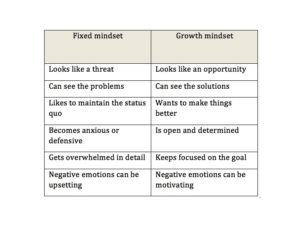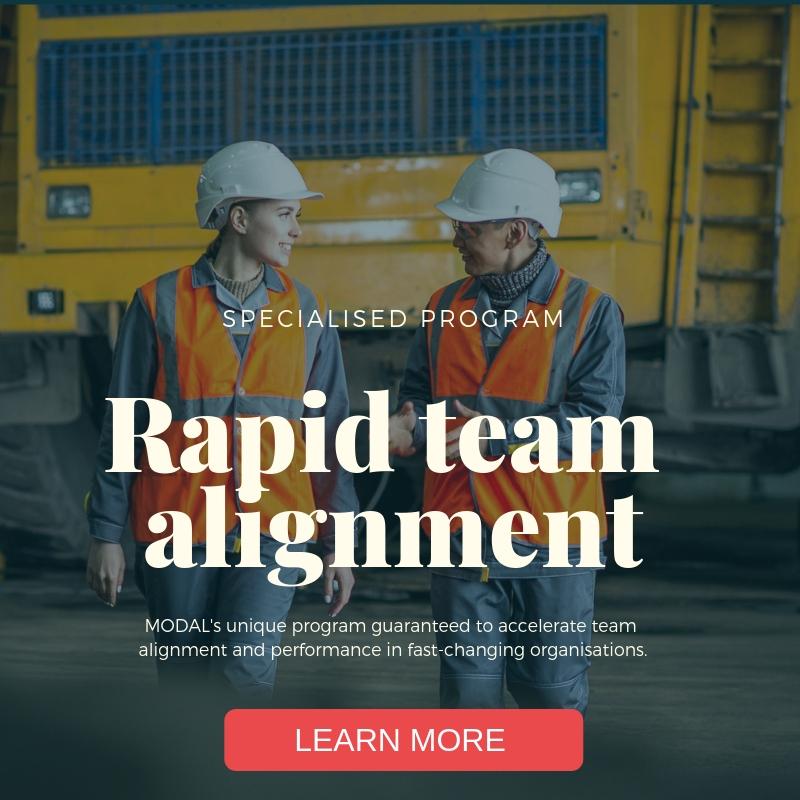Individuals who believe they can preform a task, and overcome a workplace challenge – actually do! It’s all about their mindset.
- A growth mindset, starts with positive self talk
- A growth mindset, allows individuals to flourish and grow skills
- A growth mindset, positions individuals at an advantage to overcome workplace challenges
For several years I have been designing and delivering leadership programs which encourage participants to apply learning back into the workplace to embed new skills and knowledge that set the groundwork for behavioural change. In any learning environment there is an atmosphere of possibility, creativity and change which can evoke different responses in people. As unique as each person is who walks through the door to a session, they all have one thing in common. Each person can choose what they say to themselves as they sit down in their chairs and get ready to begin. This self-talk results in them feeling either excited, annoyed, frustrated, curious or bored.
Circumstances might influence their self-talk such as the reason they are on a learning program in the first place. Has this been a personal choice or did someone (a colleague, the HR manager, the line manager, the executive team) think this program might be good for them? Looking out across the room, it is easy to spot those that want to be there and those that don’t. Those that are curious and want to grow their skills, and those that feel it is unnecessary and impinging on their time.
Being curious and open to continuous learning is one characteristic of what Carol Dweck, a psychologist at Stanford University, calls a growth mindset. People with growth mindsets believe that they have the capacity to learn and grow their skills and that if they fail, they can learn from their mistakes. They also believe their efforts and attitudes determine their outcomes. On the other hand, those that have a fixed mindset think that skills, intelligence and talents are innate abilities. If they fail, this is shameful and should be avoided, and they feel threatened when others succeed.
Neuroscience research supports this model by demonstrating that the brain is more active with a growth mindset than a fixed mindset. A study by Moser, Schroder, Heeter, Moran and Lee found that when individuals received feedback to a wrong answer, those with a growth mindset actively awaited the feedback whereas those with a fixed mindset shut down, being unreceptive to any feedback.
With a growth mindset people flourish and grow. Believing they can learn anything and thrive in challenging environments individuals are much better placed to improve performance and meet targets in the workplace. People with a growth mindset are attracted by creativity, innovation and continuous learning thereby offering valuable contributions. They are more likely to share information and ask questions that generates discussion, encourages good decision making and builds strong relationships. Individual performance in the workplace is likely to increase with a growth mindset leading to expanding possibilities and advancement. A growth mindset makes an individual feel good about themselves.
The magic of a growth mindset
During continuous change, where an organisation must navigate through volatility, uncertainly, complexity and ambiguity a growth mindset is critical for organisational survival and growth. A growth mindset embraces challenges, persists in the face of obstacles, puts in the effort to achieve mastery, learns from criticism, and finds lessons and inspiration in the success of others (from Carol Dweck’s book: Mindset: The New Psychology of Success). This table compares both mindsets.

Change in an organisation is never easy. Although there are strategies organisations can put into place to set themselves up for success such as implementing a solid communication plan, at the heart of success is having the right mindset. To David Rock, director of the NeuroLeadership Institute, having a growth mindset helps people believe that change is possible, that it is worth working towards. In any change environment whether it is a leadership development program, a new initiative in the workplace, or an organisational change, a growth mindset shifts the brain from perceiving a threat to viewing change as a challenge, allowing positive reception. This is performance magic for an organisation.
Tips and a challenge
The following is helpful in keeping myself in a growth mindset. I ask myself:
How can I be less defensive when I make mistakes?
When can I ask for more feedback and what can I learn from the feedback I receive?
What are some opportunities for more learning experiences?
How am I conducting myself around others in the workplace?
How can I try to lift others up by helping them learn or work through a challenge?
How can I be more curious?
I leave you with a challenge:
Pick one point from this list to work on this week. At the end of the week reflect on your progress, either to yourself or discuss this with a colleague. Pick another challenge next week until they are all covered.
Your transition to a growth mindset has begun!





